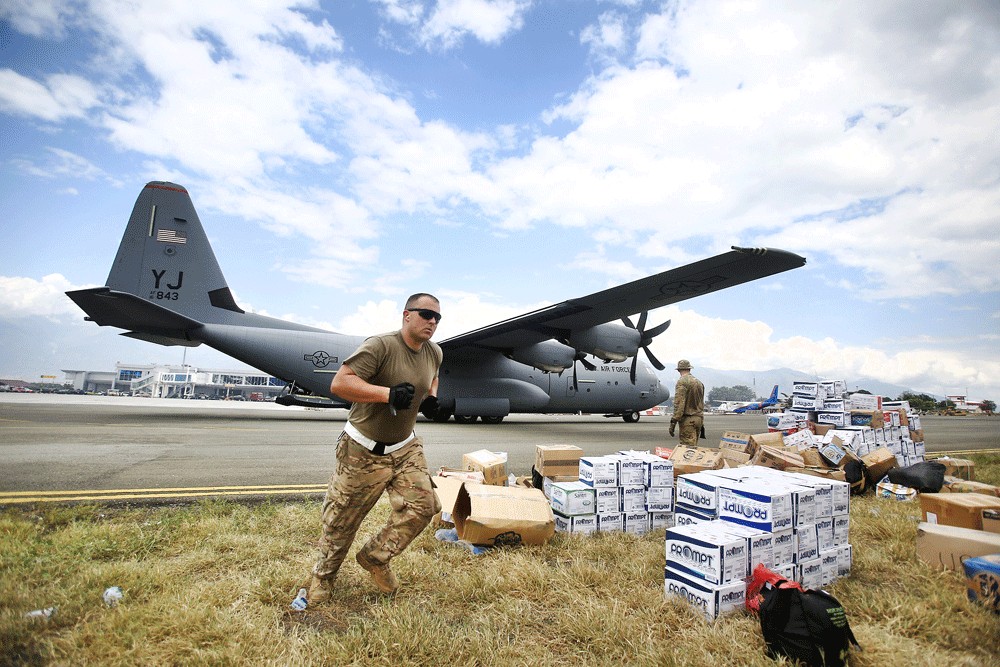Popular Reads
Top Results
Can't find what you're looking for?
View all search resultsPopular Reads
Top Results
Can't find what you're looking for?
View all search resultsIndonesia restricts foreign helpers in Central Sulawesi to 'avoid more work'
“Letting foreigners enter disaster-hit areas without limitations and clear management would just give the country’s task force more work,” BNPB spokesperson Sutopo Purwo Nugroho said.
Change text size
Gift Premium Articles
to Anyone
 United States military personnel unload humanitarian aid from a Hercules aircraft at Mutiara SIS Al-Jufrie in Palu, Central Sulawesi, on Tuesday. Emergency relief assistance from foreign countries continues to arrive for the earthquake and tsunami victims in Palu and Donggala. (The Jakarta Post/Dhoni Setiawan)
United States military personnel unload humanitarian aid from a Hercules aircraft at Mutiara SIS Al-Jufrie in Palu, Central Sulawesi, on Tuesday. Emergency relief assistance from foreign countries continues to arrive for the earthquake and tsunami victims in Palu and Donggala. (The Jakarta Post/Dhoni Setiawan)
I
ndonesia has clarified its rules regarding the flow of foreign aid workers to Central Sulawesi, which was hit by a powerful earthquake and tsunami on Sept. 28, to avoid disruptions during rescue and recovery efforts.
The National Disaster Mitigation Agency (BNPB), noting that it would be hard to manage a large number of foreign aid workers without a clear supervisory system, said it welcomed all foreign assistance, so long as there was coordination with the relevant agencies or institutions.
“Letting foreigners enter disaster-hit areas without limitations and clear management would just give the country’s task force more work,” BNPB spokesperson Sutopo Purwo Nugroho said, adding that the government had previously issued a regulation on the matter.
Based on a 2018 government regulation on international institutions’ involvement in disaster relief, international institutions and NGOs are allowed to help in disaster-relief efforts provided that they cooperate with local institutions.
Furthermore, Foreign Ministry spokesperson Arrmanatha Nasir said that such a policy was not meant to prevent assistance or volunteers from entering Central Sulawesi but to ensure that they first coordinate with national teams or agencies.
“Recent news circulated saying that we have been shooing away foreign volunteers, but what happened is we requested that they coordinate with local agencies prior to their arrival,” Arrmanatha told The Jakarta Post on Wednesday.
The government, he said, advised all foreign assistance, including volunteers, to enter the country only once they had coordinated with and received approval from the Foreign Ministry for government-to-government aid, or from the Indonesian Red Cross (PMI) or state-affiliated NGOs for aid from independent institutions.
“The National Rescue and Recovery Team is advising aid workers or volunteers that have completed their work to no longer stay in Palu, so as to allow others that need to be in Palu to enter,” he added.
Separately, the head of disaster mitigation in Palu and the Central Sulawesi regencies of Sigi and Donggala, Col. Agus Sasmita, said the number of aid workers that had been deployed to the affected areas had increased.
As of Wednesday, more than 1,000 aid workers — both foreign and local — had entered Palu, Sigi and Donggala. A medical team from Portugal even visited the isolated Lindu village in Sigi regency to help in the recovery process.
“We took the medical team to Lindu village using a helicopter,” Agus said, adding that the foreign aid workers should be assisted by their local partners or NGOs.
Meanwhile, a PMI official, I Gede Sudiartha, said all representatives from the International Red Cross were still in Palu. They came from nine countries and each country sent out five officials.
Sudiartha is among the PMI members who have assisted the foreigners in the disaster-hit regions.
United States Agency for International Development (USAID) mission director Erin McKee said separately that, despite Indonesia’s policy on foreign volunteers, the institution’s personnel in Central Sulawesi did not experience any difficulties in providing assistance. The USAID has also not received any complaints from aid workers about uneasy encounters due to their foreign volunteer status.
“We have been working with local partners in the field. We have a long-standing partnership with the PMI,” she said, adding that the US stood ready for Indonesia “as long as needed”.
A strong earthquake that hit Central Sulawesi on Sept. 28 was followed by a tsunami and soil liquefaction, claiming at least 2,045 lives as of Wednesday.
All of the bodies have been buried at public cemeteries, 969 of which were buried en masse.









